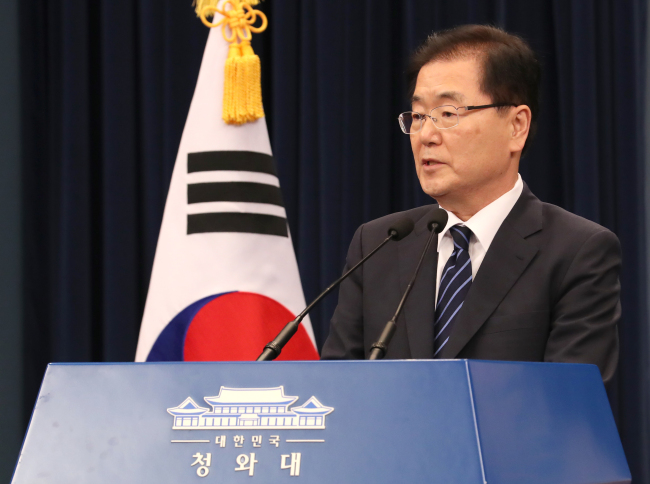New security chief says Seoul should ‘take the lead’ in restoring two-Korea relations
By Sohn Ji-youngPublished : May 21, 2017 - 18:37
President Moon Jae-in’s chief security aide said Sunday that South Korea should “take the lead” in restoring frosty inter-Korea relations, pledging to ease mounting tensions on the peninsula amid North Korea’s nuclear and missile threats.
Chung Eui-yong, a former ambassador to Geneva who was named chief of the National Security Office, also said the deployment of the US advanced missile system lacks “procedural legitimacy” and that as far as he understands neighboring countries also respect Seoul’s position on the defense equipment.
“It is quite unnatural to see suspension in the talks between the two Koreas. As far as the inter-Korean relations, I am convinced that we should take the lead to restore the relations,” Chung told reporters at Cheong Wa Dae after his appointment was announced.
The security chief, however, noted that an immediate change to the two-Korea relations is unlikely -- such as the reopening of the Kaesong Industrial Complex, a joint economic project that was regarded as a symbol of cross-border cooperation until it was “temporarily” closed in 2016 by former President Park Geun-hye.

His remarks appear to signal a shift in the new Moon administration’s foreign policy and inter-Korean relations from a military-based, hawkish and bilateral approach under the previous administration to diplomacy-based, conciliatory and multilateral one, observers said.
“Unlike the previous Park Geun-hye administration, the Moon Jae-in government will pursue a proactive approach in foreign policy and inter-Korean talks to bring the North to a negotiation table,” said Chung Seong-jang, a senior researcher at the Sejong Institute in Seoul.
Over the past Park Geun-hye administration, inter-Korea relations and major diplomatic decisions were mostly discussed among former generals who served as defense ministers, like Ret. Army Gen. Kim Gwan-jin who has worked as a security chief since 2014. But those military figures were under criticism for worsening military tension by disregarding diplomatic approaches toward North Korea.
“When it comes to North Korea’s nuclear crisis, diplomacy should play more of a role,” said Moon when he announced his appointment of Chung. “The past governments have viewed security in the context of national defense. But diplomacy is another side of security.”
High on the agenda is how to reconcile the new government’s shift in focus with the US government’s assertive stance against North Korea, which fired a ballistic missile later in the day in defiance of international condemnation.
On Tuesday, Chung met with US delegates led by Matt Pottinger, senior director for East Asia at the White House’s National Security Council. During the meeting, both sides agreed to seek “bold and pragmatic steps” in resolving Pyongyang’s nuclear ambition pledged to mobilize all available means including sanctions and dialogue, though dialogue with the North is possible only under the right conditions.
Regarding the deployment of the Terminal High Altitude Area Defense system, Chung is known to have told his counterpart that there are “issues” with the procedure leading to the deployment, indicating that the measure needs parliamentary approval. Pottinger later said the deployment was a “settled matter.”
Along with Chung, Moon also appointed a renowned pro-engagement scholar Moon Chung-in as his special adviser for unification, foreign affairs and national security.
The Seoul-based Yonsei University professor had led the rapprochement policy with North Korea under the previous liberal administration of President Roh Moo-hyun. The professor had long stressed that restoring two-Korea relations is the key to resolving decadeslong military confrontation on the peninsula.
Former chairman of presidential committee on Northeast Asia during the Roh administration, Moon Chung-in had asserted that Seoul should assume “the role as a balancer” to coordinate interest among surrounding regional powers such as the US and China.
By Yeo Jun-suk (jasonyeo@heraldcorp.com)



![[Exclusive] Korean military set to ban iPhones over 'security' concerns](http://res.heraldm.com/phpwas/restmb_idxmake.php?idx=644&simg=/content/image/2024/04/23/20240423050599_0.jpg&u=20240423183955)

![[Graphic News] 77% of young Koreans still financially dependent](http://res.heraldm.com/phpwas/restmb_idxmake.php?idx=644&simg=/content/image/2024/04/22/20240422050762_0.gif&u=)



![[Pressure points] Leggings in public: Fashion statement or social faux pas?](http://res.heraldm.com/phpwas/restmb_idxmake.php?idx=644&simg=/content/image/2024/04/23/20240423050669_0.jpg&u=)









